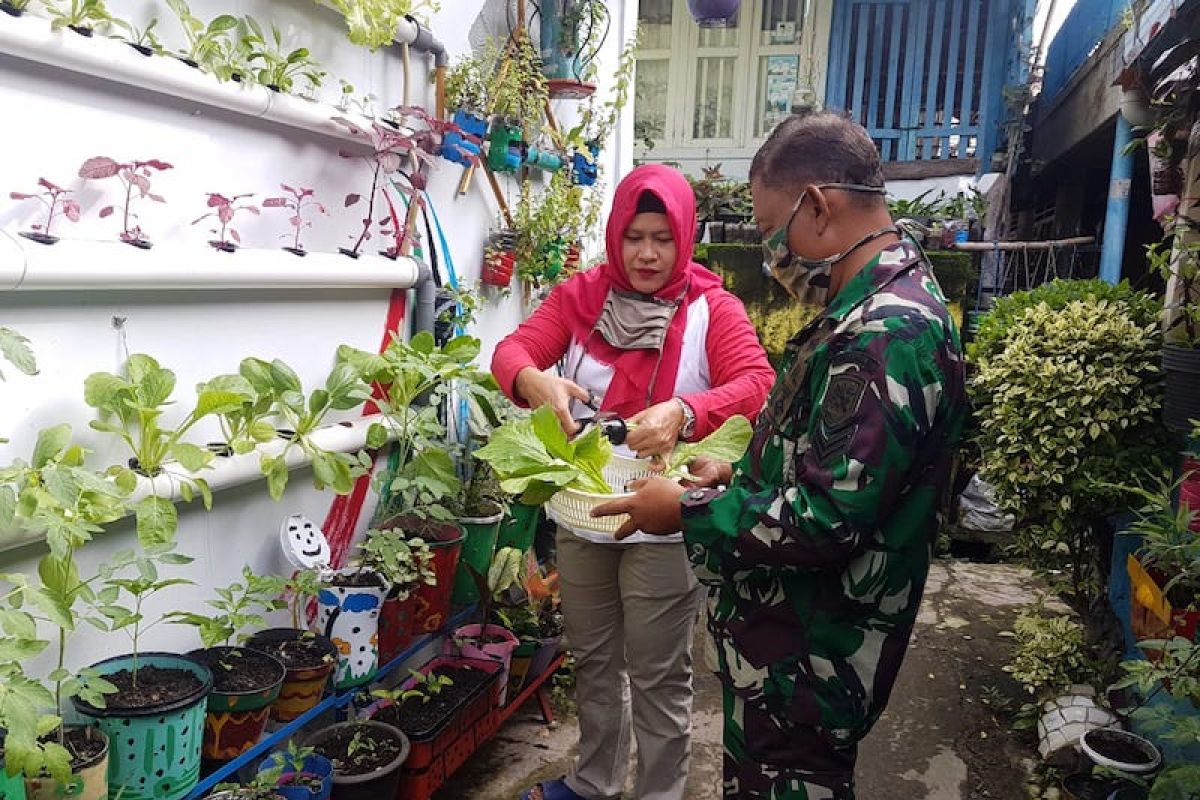This COVID-19 pandemic has yet to be able to make our people at large well aware of the importance of consuming more vegetables though they know the benefits of eating vegetables for boosting their immunityBogor, W Java (ANTARA) - The prolonged coronavirus pandemic has forced many companies in Indonesia to continue with work-from-home measures to prevent employees from getting infected or transmitting the deadly virus to others.
As a result, working from home is no longer a privilege. Instead, it has become a necessity for companies and government offices as they endeavor to halt new COVID-19 cases from arising in workplace clusters.
However, employees have at times complained of boredom as they continue their work routines from home without getting to socialize with their workmates in office environments.
Atman Ahdiat, a senior journalist, has taken to gardening to beat fatigue and reduce anxiety while working from home.
Ahdiat has begun growing a variety of green leafy vegetables, including kangkong (water spinach) and choy sum, at his home in Bekasi, West Java.
"I buy the vegetable seeds I want online," he said, adding that the vegetables he grows in his home garden are meant for his family and for sharing with neighbors.
The uncertainty surrounding the COVID-19 pandemic’s end could help campaigns promoting higher vegetable consumption to boost immunity gain traction in the country, according to Nur Fajrina, a seed researcher at PT East West Seed Indonesia (EWINDO), an integrated vegetable seed company.
In addition, home gardening, which is more popular among households in Java, needs to be introduced to people living in other Indonesian islands, she said.
Why is it necessary? Home gardening can not only help bolster food security, sources of income, and wellbeing of Indonesian households, but also help raise awareness among millennials on the importance of consuming vegetables, Nur Fajrina explained in a press statement received by ANTARA in Jakarta on Friday.
Therefore, home gardening has been included in the Indonesian government's poverty alleviation programs this year considering that through the consumption of green leafy vegetables that households harvest from their home gardens, they can meet their regular nutritional needs, she added.
Indeed, the home gardening trend has picked up in the wake of COVID-19.
A joint survey by EWINDO and UPN Yogyakarta has confirmed this trend, saying the number of home gardeners has increased almost 47 percent.
According to the survey, which was funded by the Australian Center for International Agricultural Research (ACIAR), about 47.6 percent of home gardeners live in Java, while 31.06 percent reside in Sumatra; 11.91 percent in Sulawesi; 7.02 percent in Bali and Nusa Tenggara; 2.13 percent in Kalimantan; and, 0.21 percent in Maluku and Papua.
ACIAR is an Australian government agency that claims to have commissioned and managed more than 1,500 research projects in 36 countries, partnered with 150 institutions and more than 50 Australian research organizations.
Despite the promising increase in home gardeners in Indonesia, the survey's findings show that in the midst of the global pandemic, the consumption of vegetables among Indonesian communities has remained low.
"This COVID-19 pandemic has yet to be able to make our people at large well aware of the importance of consuming more vegetables though they know the benefits of eating vegetables for boosting their immunity," remarked EWINDO’s Fajrina.
At a webinar earlier this week, she shared the findings of the survey which she conducted with UPN Yogyakarta researchers Dr. RR Rukmowati Brotodjojo and Dr. Dwi Aulia Ningrum.
According to Fajrina, the survey has shown that vegetable consumption among Indonesian communities has remained unchanged though many community members are aware of the benefits of eating vegetables for their health in the midst of the pandemic.
However, they are not yet motivated to add more vegetables to their diet, she added.
In the EWINDO-UPN survey, which covered 1,201 households with different incomes, and educational, and age backgrounds across several Indonesian provinces, 76.4 percent of the respondents said they chose to added a daily serving of vegetables to their diet for health reasons amid the pandemic.
However, just 58.2 percent of the respondents said they were consuming more fresh vegetables than prior to the pandemic. The rest admitted that their vegetable consumption remained unchanged.
The survey's findings have shown a decreasing trend in the consumption of several green leafy vegetables, such as kangkong or water spinach, spinach, and choy sum. The consumption of kangkong has declined around 11 percent, spinach 6 percent, and choy sum 3 percent, as per the survey.
So, a good understanding of the benefits of eating vegetables for better health has not automatically triggered an increase in the consumption of veggies, according to the survey.
Consuming more carbohydrates, a habit passed down from one generation to another, may have contributed to this, Fajrina said adding, changing eating habits involves tremendous effort.
The dietary habits are evident from community spending on purchase of vegetables, which has remained low, she explained.
A Statistics Indonesia (BPS) national census in 2019 had pegged monthly expenditure per capita on fruits and vegetables at just Rp65,342.
Compared to total expenditure on food, per capita spending on fruits and vegetables stood at just 11 percent, Fajrina said, adding that looking at Indonesia's highest regional minimum wages (UMR), including in Jakarta (Rp4.4 million), workers were spending just 1.5 percent of their total monthly wages on fruits and vegetables.
This is despite sufficient availability of vegetable stocks in Indonesia thanks to sustainable supplies of vegetables from farming centers, augmented by vegetable gardens cultivated by many households for their own consumption, Fajrina pointed out.
The findings of the latest survey, which has also been supported by the Alumni Research Support Facility (ASRF) Program, have further confirmed there has been no change in vegetable consumption.
The findings are supported by BPS data, which shows Indonesia's fruit and vegetable consumption in 2020 fell around 0.64 percent compared to 2019, Fajrina said. Not only that, vegetable consumption per capita per day has remained at 209 grams against the 400 grams recommended by the WHO, she added.
She concluded that the pandemic has failed to build public opinion on the importance of eating more vegetables, even though people do know about the benefits of higher vegetable consumption on building immunity.
The survey, conducted from October to November last year, has also shown that vegetable consumption among both active and inactive employees is relatively low, she said.
In addressing this factual reality, the survey has highlighted the necessity for launching a sustainable public awareness campaign on the health benefits of vegetable consumption to allow the World Health Organization (WHO) to achieve its goals.
The campaign needs to be conducted in a sustainable manner through a synergistic collaboration between the ministries of agriculture, health, as well as villages, disadvantaged regions, and in view of transmigration, she advised.
In this regard, the Indonesian Health Ministry has appealed to the people to eat healthy food through the Isi Piringku (fill my plate) Program, Fajrina said.
The program, which is aimed at educating parents and children about the importance of balanced nutrition, should be introduced since early childhood, she added.
Vegetable consumption-related campaigns that promote eating green leafy and cooked veggies would be more effective if toddlers and elementary school students get involved from early childhood, she said.
The EWINDO-UPN survey has also shown that the percentage of millennials who do not eat veggies is higher than that in the above-36 age group, she disclosed.
Based on the survey's findings, vegetable consumption among people residing in Java remains higher than that of those living outside the island.
To increase vegetable consumption in Indonesia's big cities, including Jakarta, she suggested that agricultural commodities supplied by home gardens should necessarily be introduced, besides such fresh veggies as cucumbers, carrots, and tomatoes. (INE)
Related news: Indonesia secures 6.48 million vaccine doses from Sinovac, Sinopharm
Related news: Ministry issues travel ban for Deputy House Speaker Syamsuddin
EDITED BY INE
Editor: Fardah Assegaf
Copyright © ANTARA 2021












